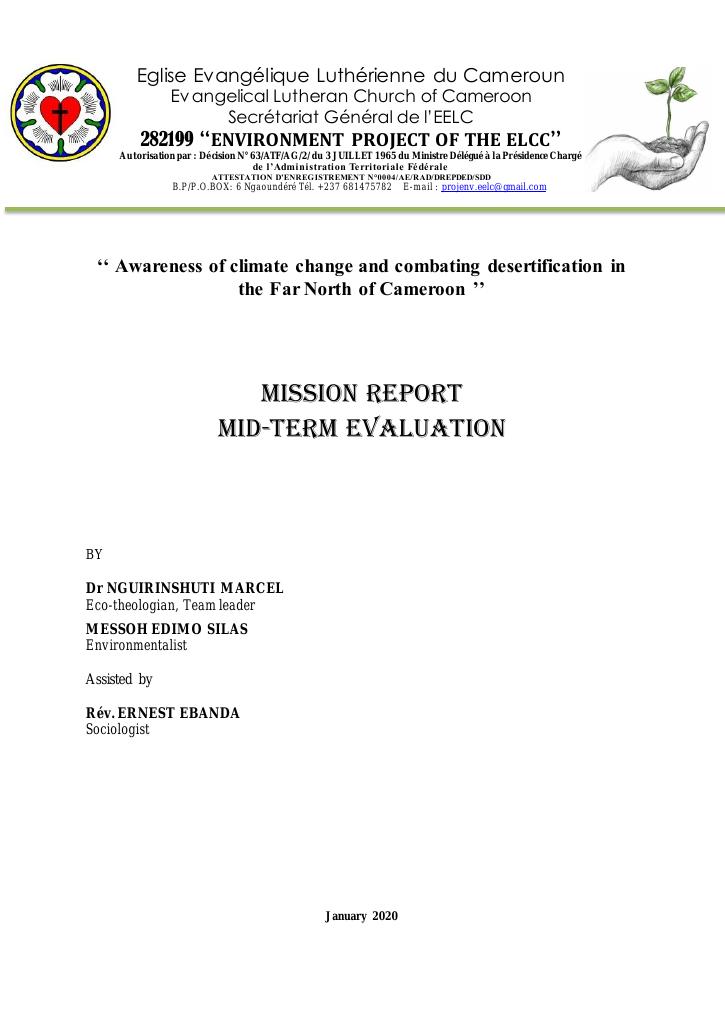Evaluering
Mission Report Mid-Term Evaluation
Background The Environment project of EELC started in 2015 and is now in it’s 2nd phase. Its objective is to "promote the awareness of populations about climate change, by helping them to identify sustainable alternative solutions to the various problems that arise." Purpose/objective Assess the effects of the Project and to formulate, on the basis of the lessons learned as well as the evolution of the context of local development, recommendations of strategic significance for its management so that it takes place in the best conditions and effectively achieves its objectives. Methodology Objective, qualitative and quantitative methods as well as field observation were used. Key findings The Project is very consistent with the needs of the target populations and has satisfactorily carried out its planned activities. Project is on the right trajectory to achieve its objectives and effects despite the administrative and financial procedures which remain somewhat restrictive, especially at the local level. Without a direct response to the difficulties of survival of the populations, there will be no effective and lasting participation of the stakeholders at the base in the actions of environmental protection of the project. Recommendations The activity program seems very ambitious and therefore needs to be refocused so as to prioritize capacity building for local actors and priority actions to build a benchmark for responsible management of ecosystems and Combating desertification. The implementation and monitoring-evaluation of local action plans is one of the prerequisites for considering any change in behavior that is part of the fight against desertification. This is why, to remove the shortcomings in this area, measures must be taken for the revision and amendment of the framework developed (mainly focused on monitoring actions) and that it be implemented without delay, at all levels of project intervention. Operationalize the network of all stakeholders in the responsible management of ecosystems and more specifically the fight against desertification. Apply local protection action plans at priority sites to enhance investments. And provide sufficient financial resources at the Project level to finance local protection action plans. Create audiovisual tools adapted to social organization and responsible management of ecosystems, including the fight against desertification on the supports for the projection of films for animation sessions at village and school level. Generalize environmental education to all schools in the project intervention area. Train teachers on the spot at their respective establishments in order to benefit the entire teaching staff in the same locality. Prepare and make available to teachers in the project intervention area appropriate educational tools including posters, posters, etc. Support schools in the creation of school green spaces, in particular the creation of nurseries for the planting of trees for the protection of educational establishments. It is important that the Central Direction of the EELC plays its role of governance and coordination in the implementation of the project, by periodically instituting coordination meetings between the Central Direction EELC and the Project Operational Team, the Focal Points which must be set up in number corresponding to a map of the extent of the intervention areas of the Project. Those responsible for the Project focal points must be non-ecclesiastical staff. Indeed, the presence of ecclesiastical staff highlights two major drawbacks: the refractory nature of members of other communities (Muslim, sister churches, etc.) and the permanent assignments of pastors. Visibility (these are actions that must be carried out in order to make visible all the achievements of the project): The Project must produce and distribute in its area of intervention, t-shorts, caps, stickers, calendars and leaflets. Signs must also be placed on the Project intervention sites. This phase should be extended by a few years. This extension will allow the complete achievement of the objectives and to register the achievements in sustainability. In order to establish a solid base of reference in terms of technique and fight against desertification, it will be necessary to break with the approach favoring quantitative objectives and to move resolutely towards qualitative results which are the only guarantees of success and promising of hope for sustainable development. The monitoring and evaluation of the Project activities had limited performances due to the lack of qualified expert to animate it within the Project team and conduct the activities relating to environmental awareness and education of all social strata of local communities. The project team should be expanded with an expert with proven experience (4 to 5 years) in organization, monitoring and evaluation, training of actors in the basis and development of local environmental communication strategies. Comments from the organisation NMS: The evaluation report gives an accurate picture of the project. NMS and EELC stands behind the findings of this report. Explanations for the Empowerment Assessment Score could be more detailed. The evaluation states that short-term benefits for the target population the activities will not be sustainable. Some of the work intended to be voluntary ended up being paid for in cash by the project. The project is now providing tree seedlings that can generate income for the population and has also focused more on individual planting and not just collectively planting of trees. The evaluation underlines the need for more HR-resources to obtain the planned results. In the budget for 2021 salary for an assistant has been included. The delay in funds has been a problem several times during the project period. This has been caused by both NMS, EELC and the Cameroonian government bank regulations. Some measures have been taken to mitigate the risk of funds arriving too late for some activities. Digni will together with NMS follow up closely the future plans for the project and the following up of the evaluation.
